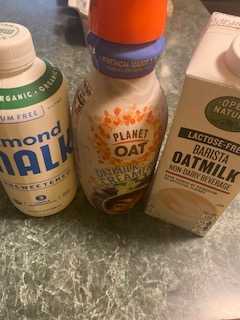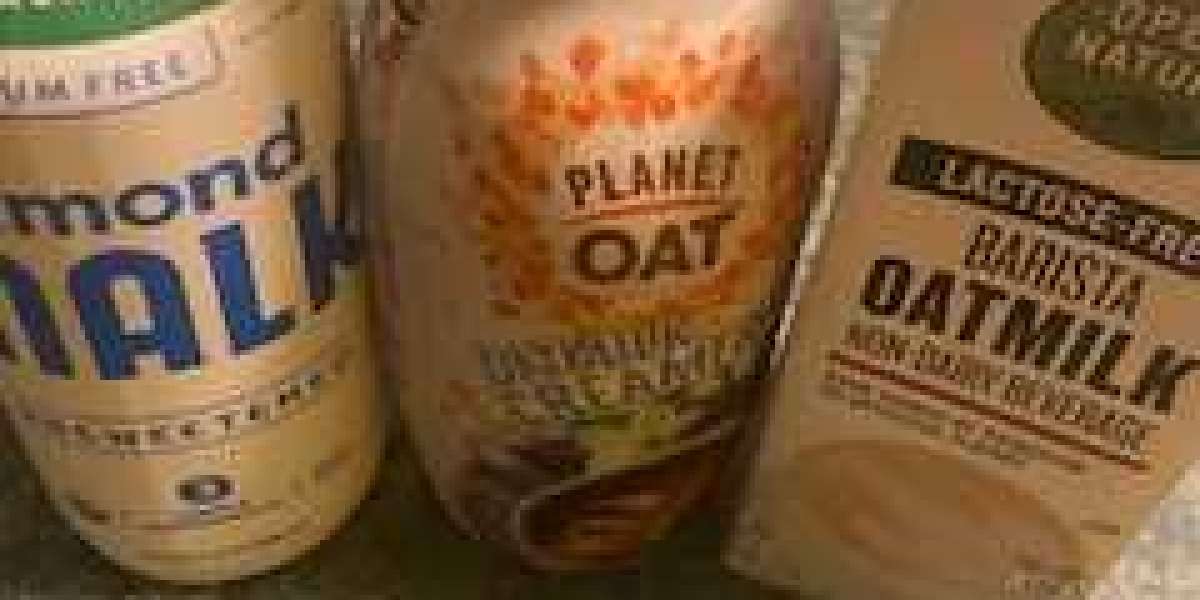There about a dozen plant-based options for consuming milk. Today's article courtesy of Healthline, highlights 7 types of milk including the benefits of healthy cow milk. Subsequent to reading, please do the research local to your community and then decide what's best for you and your family.

- Almond milk.
- Banana milk.
- Cashew milk.
- Coconut milk.
- Cow's milk.
- Flax milk.
- Hazelnut milk.
- Hemp milk.
- Low-fat milk.
- Macadamia milk.
- Milk free of A1 beta casein protein.
- Pea milk.
- Pistachio milk.
- Soy milk.
- Spelt milk.
- Quinoa milk.
- Walnut milk.
1-HEMP MILK
Hemp milk is made from ground, soaked hemp seeds, which do not contain the psychoactive component of the Cannabis sativa plant.
The seeds are high in protein and healthy omega-3 and omega-6 unsaturated fats. Thus, hemp milk contains a slighter high amount of these nutrients than other plant milks.
An 8-ounce (240-ml) serving of hemp milk provides the following (1Trusted Source):
- Calories: 60
- Protein: 3 grams
- Carbs: 0 grams
- Fat: 5 grams
- Phosphorus: 25% of the Daily Value (DV)
- Calcium: 20% of the DV
- Magnesium: 15% of the DV
- Iron: 10% of the DV
Hemp milk is virtually carb-free, but some brands add sweeteners, which increase the carb content. Make sure to check the ingredient label and buy hemp — and any other plant milk — without added sugar.
Sugar may be listed on the ingredient label as brown rice syrup, evaporated cane juice, or cane sugar.
SUMMARYHemp milk is made from the seeds of the Cannabis sativa plant. While the beverage doesn’t have any psychoactive effects, it provides more healthy fats and protein than other plant milks.
Though drinking milk made by soaking whole oats doesn’t offer quite the same health benefits as eating a bowl of whole grain oats, it is very nutritious.
Oat milk is naturally sweet from the oats and high in carbs. It’s unusual in that it contains some soluble fiber, which makes oat milk a bit creamier.
Soluble fiber absorbs water and turns into a gel during digestion, which helps slow digestion and keeps you full for longer. It can also help stabilize your blood sugar levels.
What’s more, the soluble fiber in oat milk may reduce your cholesterol levels. A 5-week study in 52 men showed that drinking oat milk lowered LDL (bad) cholesterol levels, compared with a control beverage (2Trusted Source).
Although nutritional values can vary by brand and depending on how or whether the milk is fortified, an 8-ounce (240-ml) serving of Oatly oat milk provides the following:
- Calories: 120
- Protein: 3 grams
- Carbs: 16 grams
- Fiber: 2 grams
- Fat: 5 grams
- Vitamin B12: 50% of the DV
- Riboflavin: 46% of the DV
- Calcium: 27% of the DV
- Phosphorus: 22% of the DV
- Vitamin D: 18% of the DV
- Vitamin A: 18% of the DV
SUMMARYOat milk is higher in carbs than most other plant milks, and it also boasts extra fiber. Much of the fiber in oats is soluble fiber, which offers several health benefits, such as reducing your cholesterol levels and keeping you full for longer. Some critics of OAT milk notes, that it is used for horses and it should remain there. Just sayin...
Almond milk is made by soaking almonds in water and then blending and straining away the solids.
It’s a tasty nondairy milk alternative for people who either can’t tolerate or choose not to drink dairy milk, but it’s not safe if you have a tree nut allergy.
Unsweetened almond milk is low in calories and much lower in carbs than cow’s milk, making it a good choice if you follow a lower carb diet (3Trusted Source).
However, note that many brands contain added sugar. Always check the ingredient label and avoid those that are sweetened.
Although almond milk is a naturally good source of the antioxidant vitamin E, it’s low in protein and many other nutrients. Many brands are fortified with calcium and vitamins A and D, but the amounts can vary by brand.
On average, an 8-ounce (240-ml) serving of unsweetened almond milk provides the following (4Trusted Source):
- Calories: 41
- Protein: 1 gram
- Carbs: 2 grams
- Fat: 3 grams
- Vitamin E: 50% of the DV
Many brands contain additives like carrageenan to thicken and prevent separation.
There is some debate about whether carrageenan promotes intestinal inflammation and damage. Still, most of the research on carrageenan and gut health has been conducted in animals and labs (5Trusted Source,6Trusted Source).
SUMMARYAlmond milk is a good nondairy milk alternative, but nutritionally, it’s quite different from cow’s milk. If you’re after its lower carb content, make sure you choose an unsweetened brand. Also, the brand of almond milk matters. Some are more water based than almond based. The brand that I used to purchase from Whole Foods is no longer available. Hmmmmm! Do your research.
Coconut milk is squeezed from the white flesh of a coconut. It has a pleasant flavor, and it’s a good nondairy milk alternative that’s safe if you have a tree nut allergy.
Most coconut milk packaged in cartons is blended with water to give it a consistency similar to that of cow’s milk. It has even less protein than almond milk, but many brands are fortified with certain nutrients.
On the other hand, canned coconut milk is usually intended for culinary purposes. It tends to be higher in fat, is unfortified, and has a much more distinctive coconut flavor.
An 8-ounce (240-ml) serving of an unsweetened coconut milk beverage provides the following (7Trusted Source):
- Calories: 46
- Protein: none
- Carbs: 1 gram
- Fat: 4 grams
Coconut milk is a bit higher in fat than other plant milks, but the medium-chain triglycerides (MCTs) in coconuts is linked to some heart health benefits, such as higher HDL (good) cholesterol levels (3Trusted Source).
Some brands are also fortified with nutrients like vitamins B12, D, and A, as well as some minerals. The type and amount of nutrients added can vary among brands, so be sure to compare the labels.
SUMMARYCoconut milk has a light, tropical flavor and is a safe dairy-free milk alternative for those who have a tree nut allergy. Because coconuts are a source of healthy MCTs, drinking coconut milk might boost your HDL (good) cholesterol. I typically consume coconut milk with adding to some of my favorite recipes but never used in my smoothies or coffee. Will be testing out for 2023.
Cow’s milk is the most commonly consumed dairy milk and a good source of high-quality protein (8Trusted Source).
It’s naturally rich in calcium, B vitamins, and many minerals. It’s also often fortified with vitamins A and D, making it a very nutritious food for both children and adults (8Trusted Source).
An 8-ounce (240-ml) serving of whole milk provides the following (9Trusted Source):
- Calories: 149
- Protein: 8 grams
- Carbs: 12 grams
- Fat: 8 grams
- Vitamin D: 24% of the DV
- Calcium: 28% of the DV
- Riboflavin: 26% of the DV
- Phosphorus: 22% of the DV
- Vitamin B12: 18% of the DV
- Selenium: 13% of the DV
- Potassium: 10% of the DV
Nevertheless, the protein in cow’s milk is a common allergen. Most children outgrow it, but some people have a lifelong allergy and need to avoid this beverage and foods containing it (3Trusted Source).
In addition, an estimated 65% of the population has some degree of difficulty digesting lactose, a type of sugar in cow’s milk (10).
SUMMARYRegular cow’s milk is an excellent source of nutrition, but due to lactose intolerance or milk protein allergy, many people have difficulty digesting it or must avoid it altogether. People have also become lactose intolerant based on how they raised and breed cows.
Approximately 80% of the protein in cow’s milk comes from casein. Most dairy cows in the United States produce milk that has two main types of casein — A1 beta-casein and A2 beta-casein.
When A1 beta-casein is digested, a peptide called beta-casomorphin-7 (BCM-7) is produced. It’s linked to digestive symptoms similar to those of lactose intolerance in some people, including gas, bloating, constipation, and diarrhea (11Trusted Source).
Certain dairy cows produce milk that contains only A2 beta-casein, which doesn’t form the BCM-7 peptide. The a2 Milk Company markets A2 milk as an easier-to-digest option (12).
A small study in 45 people with self-reported lactose intolerance found that A2 milk was easier to digest and caused less digestive discomfort, compared with regular cow’s milk (13Trusted Source).
Aside from casein, A2 milk is comparable to regular cow’s milk. While it’s not a good choice if you are allergic to milk protein or lactose intolerant, it might be worth a try if you experience mild digestive problems after drinking regular cow’s milk.
SUMMARYA2 milk contains only A2 beta-casein, and some people find it easier to digest than cow’s milk. However, it’s not a good choice if you’ve been diagnosed with a milk protein allergy or lactose intolerance.
Nutritionally, soy milk comes closest to cow’s milk. This is partly because soybeans are an excellent source of complete protein, as well as because it’s fortified so that its nutritional profile closely resembles that of milk (3Trusted Source).
Soy is a great option if you avoid dairy but want a milk beverage that’s higher in protein.
An 8-ounce (240-ml) serving of unsweetened soy milk provides the following (14Trusted Source):
- Calories: 105
- Protein: 6 grams
- Carbs: 12 grams
- Fat: 4 grams
- Vitamin B12: 34% of the DV
- Calcium: 30% of the DV
- Riboflavin: 26% of the DV
- Vitamin D: 26% of the DV
- Phosphorus: 10% of the DV
Soy has been the subject of controversy, as most soybeans grown in the United States are genetically modified to resist the herbicide glyphosate.
However, regularly consuming soy foods is linked to health benefits, including improved cholesterol and blood pressure levels.
Furthermore, despite claims that soy may increase breast cancer risk because it mimics estrogen in the body, scientific studies suggest that it may reduce this risk (15Trusted Source).
Some brands produce organic soymilk, which is made from non-genetically modified organism (non-GMO) soybeans and free from conventional pesticides and herbicides.
SUMMARYIf you want a nondairy milk alternative that’s higher in protein and nutritionally closer to cow’s milk, consider soy milk. Drinking soy milk may also help reduce your cholesterol, blood pressure, and breast cancer risk. I used soy milk years ago until my doctor indicated it's known to promote fatty tissue that can then lead to cancer. Today, the research indicates that is the case.
While there are pros and cons for each milk type, some research lends to the health advantages to consuming milk. Some benefits include reducing your cholesterol, boosting your antioxidant intake, bone health, or keeping you safe from an allergy or intolerance. The bottomline is simply: don't over consume any of your favorites. Do the research and mix it up. The More you Know the More you GROW!
Shalom
Sis CeeCee















Ron Lavender 3 yrs
Nice break down Sis CeeCee.